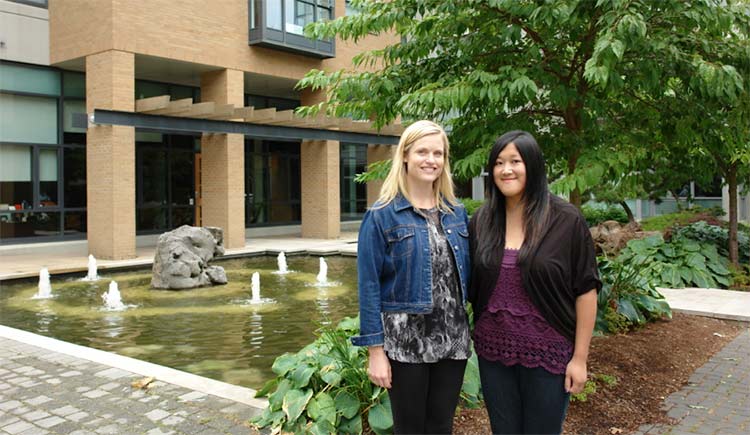

By Bryan Zandberg
As a directed studies project in the First Nations and Indigenous Studies Program, Karrmen Crey and Amy Perreault recently completed What I Learned in Class Today, a film documenting the responses of nine students to intentional and unintentional occurrences of racism.
Karrmen Crey and Amy Perreault say their video project began as a vent session in a course they were taking with First Nations and Indigenous Studies Professor Linc Kesler.
“We would start the class by telling stories about classes we were in,” relates Crey, a recent graduate of the program.
The stories, she adds, were a way of dealing with some of the offensive and ignorant statements they had heard about Aboriginal people — not on the street, but right in their classes at UBC.
“They were kind of funny, they were, of course, kind of absurd,” Crey says of the remarks of some UBC students and professors.
The statements were profoundly hurtful, often for no other reason than the fact that non-Aboriginal students sometimes forget that in talking about the historic challenges faced by Canada’s First Nations, they are talking about issues that Aboriginal students among them have experienced themselves.
Noting a pattern, Kesler observed that it would be a good idea to gather the stories of Aboriginal and non-Aboriginal students alike.
That suggestion lit a fire under Crey and Perreault — both senior undergraduate students at the time. They were highly interested in developing a resource that would help fellow students and faculty discuss sensitive inter-cultural issues without hurting, or alienating people.
As a directed studies project in the First Nations Studies Program, Crey and Perreault recently completed What I Learned in Class Today.
Video, they discovered, was a perfect medium, especially for getting uncomfortable first-person experiences out in the open.
They’ve screened a preliminary version of the video at several forums, including UBC’s Realities of Race conference in March 2007. In each case, audience members have been struck by the honesty of the students, who express their stories in their own words.
“You read a report, you can look at statistics, but actually being faced with students at UBC right now who are experiencing these things is pretty powerful.”
Dara Kelly is one Aboriginal student interviewed in the film. A member of the Fraser Valley Le’qa:mel First Nation, Kelly was in an English class with a focus on Aboriginal authors last year when one student prefaced a group discussion by asking why Aboriginal people were so “screwed up.”
For Kelly, that comment felt like a slap in the face, and in the film she candidly discusses why she finds the remark totally unacceptable.
“At the same time, when that kind of incident happens, it’s almost so shocking, or unbelievable, or hurtful that nobody says anything, and nobody knows what to do,” she says.
That’s one of the reasons Crey and Perreault created the video in the first place — the aim is to talk about these discussions, and to acknowledge that these aren’t just difficult for Aboriginal students.
People may recognize that something is racist, or insensitive, but not know what to do, or say, underscore Crey and Perreault.
Crey and Perreault say they intend to widen the scope of the project and add more interviews, as well as related classroom material, to accompany the film.
With the broad goal of removing an institutional barrier to Aboriginal post-secondary education, they plan on crafting their project to make it a resource for teachers at UBC and other institutions, something relevant to larger, multi-ethnic audiences.
“This video is here and it’s available,” Perreault says, “so let’s start talking about it instead of not talking about it, or talking about it in the hallway after class.”


